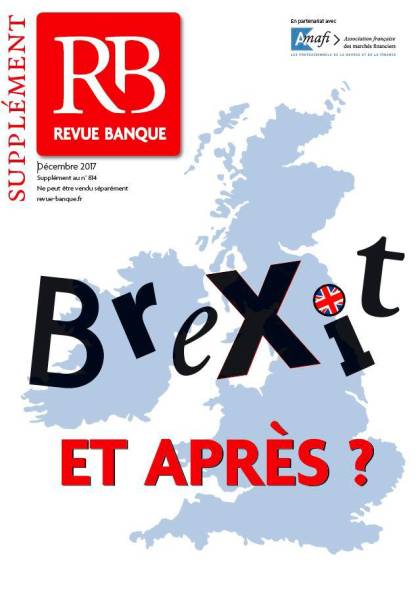Months have passed since Article 50 submission by Theresa May and despite the start of Brexit’s negotiations between the United Kingdom (UK) and the European Union (EU), a large number of uncertainties remains. Even if a “soft Brexit” scenario remains theoretically possible, a “hard Brexit” scenario, implying relatively low levels of market access and significant transformation for banks, is more likely to happen as negotiations are moving forward.
In this context, the banking industry has less than two years to rethink its future on the European continent. Hence, what could be the new face of the banking sector in Europe post Brexit?
The future of the City
The future of London as the world’s top financial center with almost
The issue of the geographical location of clearing activities of euro-dominated contracts will play a major part in determining the future of London. Indeed, the EU faces a dilemma between the importance of ensuring the financial stability and the continuity of activities post Brexit, vs. the sovereignty issues regarding supervision of the clearing business. It also triggers thinking on contingency planning from banks to relocate branches and staff overseas.
Will this potential transfer of jobs and activities affect the City as the world’s top financial center post Brexit? The joint PwC-CityUK report “A vision for a transformed, world-leading
Eventually, one major risk for the future shape of the City lies in the duration of the negotiations. Political battles may extend negotiations and postpone decisions until the last moment. As relocating activities and workforce is an expensive operation, this scenario could compel banks to wait until the cliff-edge. To avoid this, banks could decide on moving both business and staff before the negotiations outcome, taking the risk of relocating in a greater extent than what could actually be necessary. Most banks have already targeted cities to implement their new European financial hub and planned for the activities to transfer EEA clients’ related operations there. These banks are working under the assumption that, if the risk of loss of passporting is not fully mitigated by early 2018, they would start execute their Brexit contingency plans.
New European hubs
Frankfurt is announced to host most of the banks (Goldman Sachs, UBS and Morgan Stanley) that have already declared their intention to relocate part of their activities in Europe. Main arguments are the presence of the European Central Bank and multiple factors such as tax stability, the strength of Germany’s economy and its central political position in Europe.
According to Deutsche Bank’s CEO, banks may use technology to transform jobs and businesses, therefore mitigating Brexit impact. Henceforth, Brexit could trigger the launch of many transformation programs.
Despite many efforts, Paris may not be seen as the favorite destination for European banks. At this point, only HSBC officially has declared that the French capital might become its continental basis. JPMorgan’s CEO says he eyes Paris for several dozen of post-Brexit job moves. Perceptions of Paris as an environment with complex and changing laws, tax issues… is still a drawback for decision makers. Aware of these issues, President Macron has undertaken a series of reforms to enhance French attractiveness, and promised to lower the corporate tax rate by 2022. Brexit could be an opportunity for Paris to attract banking experts that may reinforce some specific financial skill set.
The European outsiders
Other cities have managed to attract banks’ attention. Dublin will probably welcome many actors due to both its cultural proximity with the UK, and its tax level. A recent study has shown that 59 Financial Institutions (FI) consider moving to
The city of Luxemburg may become the European leader for its part in private banking after several announcements that confirm the new status of the city.
Ensuring a regulatory convergence
While all these places are competing to increase their attractiveness, the EU is trying to anticipate the impacts of Brexit. In particular, ensuring a regulatory convergence while the business post Brexit heads towards a heterogeneous distribution across the EU will be a tremendous challenge.
Since 2007, the banking sector has been through significant turmoil, triggering an important reinforcement of the regulatory arsenal deployed by European and local regulators. As the regulatory landscape is constantly evolving, it increasingly drives banks’ transformation effort and sets new constraints vis-à-vis their business development. Thus, offering a more accommodating regulatory environment could be a strong argument for European financial places to attract major stakeholders.
The European Banking Authority has already announced the release of recommendations to ensure a common approach towards the future European regulatory framework to prevent regulatory
The UK perspective
From a UK perspective, increased regulatory convergence raises questions. EC has already started to think about a possible application of the “equivalence regime” to the UK to grant reciprocal market
Taking into account these various scenarios, banks already initiated reflections on how they should rethink their operating model to maintain their business level across EU and UK in the future.
The evolution of the bank’s organisational model
Pressed by Brexit to move forward, Prudential Regulation Authority (PRA) issued in April a letter requiring contingency plans from financial institutions. The impacts of Brexit differ depending on the financial institutions’ geographic footprint, the scale and complexity of banks’ organizational model and the extent of their cross-border trading business activity. Three types of answers to a “hard Brexit” emerge, as explained in the joint PwC-AFME study “Planning for
- Banks predominantly using a hub as a base to serve clients across the EU promote the transfer of part of their UK operations to one or more existing EU jurisdictions where they have an existing footprint.
- Pan-European banks are generally looking for a limited amount of legal entity restructuring, as well as seeking regulatory approval for any additional local licences, and to relocate sales staff to serve their clients locally.
- Domestically-focused banks requiring access to UK and EU markets prefer to set up local sales, trading and general management activities in a new location.
The operational impacts
Banks predominantly using a hub will need regulatory approvals for the legal entity structures that they seek to update and licenses to develop their wholesale banking and capital markets activities. It will involve complex transformations such as changing their trade booking models and associated operational activities, with the migration of some trading and support activities, giving rise to duplication of functions. They will also need to migrate customer contracts from UK to EU legal entities, to change technology infrastructure to provide IT support for expanded operations in their EU jurisdictions. In addition, they will have to take care of their employees, relocate staff, hire new staff locally and prepare an action plan responding to any changes in immigration rules that affect those concerned by Brexit. A Brexit transformation program for this kind of banks is assumed to take at least 4 years. Therefore, these banks will first have to focus on short-term solutions to limit client impact at point of exit.
Domestically-focused banks will face similar challenges on a smaller scale. They should be able to complete their Brexit transformation program in 2 to 3 years, mainly depending on their reactivity to make jurisdictional choices and to start regulatory and legal work.
Pan-European banks are generally in a stronger position and should be spared on aspects such as material changes, expansion of group functions in existing jurisdictions, set up of new premises and significant hiring of new staff. These banks should be able to implement the necessary changes within the 2 years’ timeframe, thus affording to wait and see how early Brexit negotiations develop before acting and even seek a competitive advantage from it.
The clock is ticking and with important milestones in the near future, such as EU summit in December 2017, the need for clarity on principles for exit agreement and regulatory expectations throughout the withdrawal period becomes all the more urgent. Even more, when considering that Brexit imposes a fixed timeline on the withdrawal process, which means that all market participants will be implementing changes during the same period.








![[Web Only] Tarifs bancaires : les banques amortissent l’inflation [Web Only] Tarifs bancaires : les banques amortissent l’inflation](http://www.revue-banque.fr/binrepository/480x320/0c0/0d0/none/9739565/MEBW/gettyimages-968963256-frais-bancaires_221-3514277_20240417171729.jpg)




